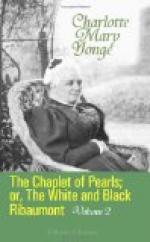Nearly six weeks had been spent in struggling along the cross-roads, or rather in endless delays; and when at last they came on more frequented ways, with better inns, well-paved chaussees, and horses more fit for use, Berenger was almost beyond feeling the improvement. At their last halt, even Philip was for waiting and sending on to Paris to inform Sir Francis Walsingham of their situation; but Berenger only shook his head, dressed himself, and imperatively signed to go on. It was a bright morning, with a clear frost, and the towers and steeples of Paris presently began to appear above the poplars that bordered the way; but by this time Berenger was reeling in his saddle, and he presently became so faint and dizzy, that Philip and Humfrey were obliged to lift him from his horse, and lay him under an elm-tree that stood a little back from the road.
‘Look up, sir, it is but a league further,’ quoth Humfrey; ’I can see the roof of the big church they call Notre-Dame.’
‘He does not open his eyes, he is swooning,’ said Philip. ’He must have some cordial, ere he can sit his horse. Can you think of no lace where we could get a drop of wine or strong waters?’
’Not I, Master Philip. We passed a convent wall but now, but ’twas a nunnery, as good as a grave against poor travelers. I would ride on, and get some of Sir Francis’s folk to bring a litter or coach, but I doubt me if I could get past the barrier without my young Lord’s safe-conduct.’
Berenger, hearing all, here made an effort to raise himself, but sank back against Philip’s shoulder. Just then, a trampling and lumbering became audible, and on the road behind appeared first three horsemen riding abreast, streaming with black and white ribbons; then eight pair of black horses, a man walking at the crested heads of each couple, and behind these a coach, shaped like an urn reversed, and with a coronet on the top, silvered, while the vehicle itself was, melon-like, fluted, alternately black, with silver figures, and white with black landscapes; and with white draperies, embroidered with black and silver, floating from the windows. Four lacqueys, in the same magpie-colouring, stood behind, and outriders followed; but as the cavalcade approached the group by the road-side, one of the horsemen paused, saying lightly, ’Over near the walls from an affair of honour! Has he caught it badly? Who was the other?’
Ere Guibert could answer, the curtains were thrust aside, the coach stopped, a lady’s head and hand appeared, and a female voice exclaimed, in much alarm, ’Halt! Ho, you there, in our colours, come here. What is it? My brother here? Is he wounded?’
‘It is no wound, Madame,’ said Guibert, shoved forward by his English comrades, ’it is M.le Baron de Ribaumont who is taken ill, and—ah! here is Monsieur Philippe.’
For Philip, seeing a thick black veil put back from the face of the most beautiful lady who had ever appeared to him, stepped forward, hat in hand, as she exclaimed, ’Le Baron de Ribaumont! Can it be true? What means this? What ails him?’




